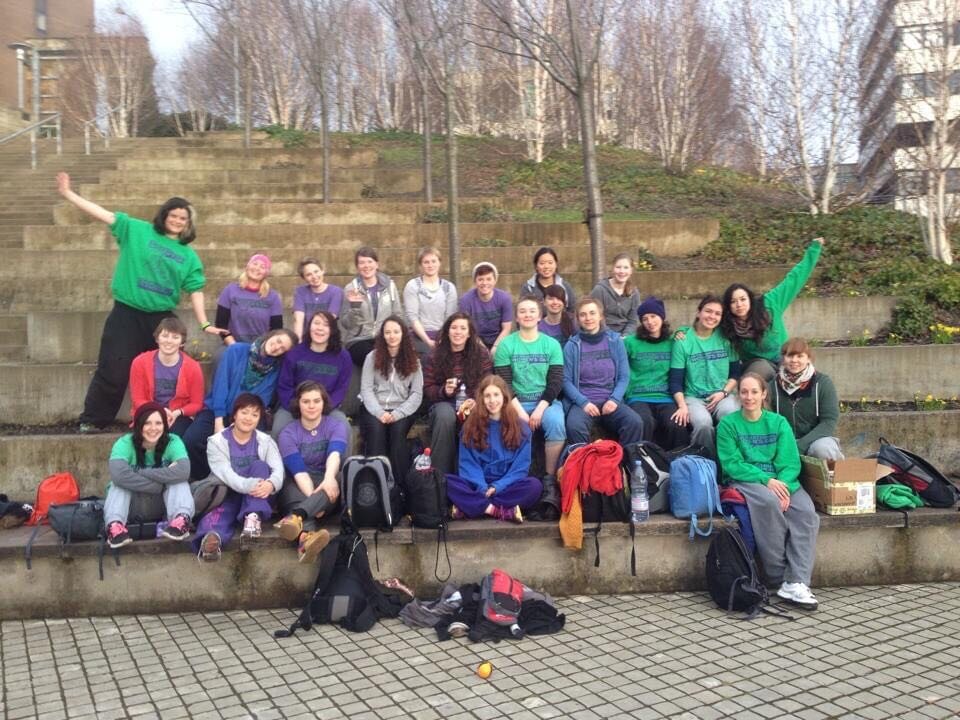Kel Glaister: What I learned training parkour in Scotland
Kel is a brilliant parkour practitioner and coach who founded Melbourne in Motion. A few months ago, Kel republished our Spider-Man Parkour blog on the Melbourne in Motion site, which was very cool. Kel offered to write us a blog as an exchanged so we jumped at the chance. If you like what they’ve written, go seek her and Melbourne in Motion out on social media (or in person if you’re in Australia!) and give some love. On Instagram, Kel can be found at @kelglaister and Melbourne in Motion can be found at @melbinmotion
Kel, doing what Kel does best, hanging off of grimy urban infrastructure and smiling.
I’m currently living in Melbourne, Australia, where I grew up. But I was lucky enough to live, train and coach parkour in Glasgow for several years. I miss it every day and still think of it as home. I know that my ability to travel and live in a new country was a tremendous privilege. Both because I had access to the financial and other resources required, and because there wasn’t a damn pandemic happening at the time. Maybe it’s a bit gauche to be writing a blog right now about how important travel has been to me and my parkour training, but there are ways to get the same effect without running away to the other side of the world.
So, here are a few things I learnt training parkour in Scotland (aside from how to stick a precision in the wet):
It’s all relative
Leaning into a cliche here, but I’ll start a blog post about living in Glasgow with a bit about the rubbish weather. I first moved to Scotland in a pretty harsh winter; and I had never seen ice on a footpath before. Training that winter, I felt like a baby giraffe most of the time, while everyone else seemed to just know what to do.
Then I had to come back to Melbourne during summer for a visit and to sort out visa stuff. I thought I was dying, it was so hot. (Spoilers - It wasn’t that hot.)
I’d always known intellectually that what I (and others) could and couldn’t do was relative to circumstances. I don’t think I ever truly understood that until somewhere between the 10th and 50th time falling on my arse on an icy path.
Comparing yourself to others is maybe the easiest way to feel crappy and unmotivated. Training parkour in Scotland helped me to measure myself against me instead.
Communities are DIY
I had several, overlapping roles in the Glasgow and Scottish parkour communities. A regular student at classes, an organiser (particularly with the women’s communities), a coach, eventually roles in governance at the national level.
How’d I get there? Mostly, by hanging around.
Remember, decisions are made by those that show up. If you want to be involved (and you don’t have to, it’s a lot of work), ask around. Ask how to become a coach, or how to join a committee.If you’re in Scotland, send an email to Parkour Outreach, I’m sure they have loads of advice. Make your own jams or events or projects. Start discussions that interest you. Hang around, be annoying. It worked for me.
The difference can be different
I’ve been involved with communities and projects focused on women and gender minorities in several cities now. And I recognise now, that when I first came to Scotland, I expected (unconsciously) that those communities would have more in common than they did. An example that comes to mind is groups that focus on marginalised people: some may welcome allies, others might ask them to stay away.
When marginalised people make their communities (formally or informally), they are always intersecting with culture and happenstance in fascinating ways. There’s no one true way to make space for yourself.
If you’re a visitor or new to a city, be curious about new communities you meet. It’s better to learn new things than to assume everyone should be doing things your way.
There is no freedom without support.
Here’s a story. I broke my leg skateboarding in Kelvinbridge park. It was the simplest little mistake, but, oops! Bone snapped. And you know what happened? My friend took me to the hospital, the NHS fixed me right up, and I went on my merry way (on crutches.) Probably with less stress and paperwork than if I had done here in Melbourne; even though I was an immigrant.
I know this blog has a mostly Scottish audience, so I won’t flex on people without universal healthcare too hard here. I just want to use it as an example of the systems of support and care we all need, as a prerequisite for freedom.
I’d say one of the main things that draws many of us to parkour is the freedom it offers; no rules, no timetables, no set paths. But that can sometimes slip gears into an individualistic mindset. The truth is, none of us will ever experience the freedom of movement we so love without the care and support of others. Your coaches and instructors. Your training buddies. Your family. And yeah, even society (and health services.)
So what did I learn from this story? It made me (all the more) aware that some people do not have the support behind them to ever really feel free. What would have happened if I had chosen to study in New York instead of Glasgow? Would that simple broken bone have meant thousands of dollars of debt? I was able to attempt to learn to skate in my thirties in a foreign country, in part, because I knew I had social support around me if things went wrong. But it’s all a lot more quotidian than that. Some folks do not have the privilege of free movement because police and law enforcement do not support their rights in the same way they do mine, a white woman. Some people do not have the emotional safety and support they need to develop risk intelligence and confidence in their bodies. Some people’s physical literacy was not supported growing up. This is a whole blog post by itself, but my point is, if you’re a coach or leader, and someone tells you that something is impossible or scary for them, even if you think it should be easy, maybe consider what supports they are missing to access that freedom.
And now??
Very few of us are able to travel as much or as often as we’d like. But, there are cheap, free and accessible ways to gain some of the benefits. For one, you don’t have to travel far. Take a train or bus to the next city and you’ll learn something.
Social media, while admittedly is generally evil, can be a great way to see how other people move, and think about or teach movement. But you have to be intentional to really open up the horizons: Are you following people who don’t look like you? Are you watching videos by, and valuing the movement of, people of different genders, or ages, or disabilities? Are you following parkour leaders and practitioners from all continents? (I’m working on making videos in Antarctica. I’ll race you there :D) I was so excited to be able to access parkour and movement classes online, during the height of the pandemic, and many still exist as recorded videos. There are discord servers (jump in on Parkour Earth!) to have in-depth discussions and share experiences.
I’m currently in a city with more COVID cases per day than ever, and travelling again still seems like a distant impossibility (although I know it’s better in Europe at the moment.). But, while the pandemic has had precious few silver linings, one is that I feel more connected to the global parkour community than ever before.




